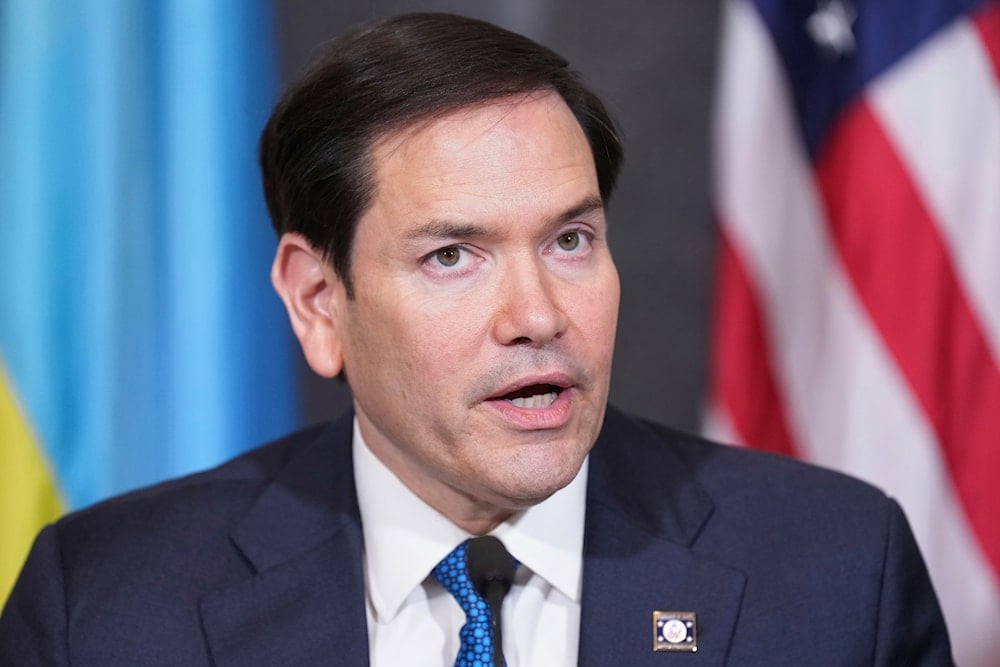Rubio urges India, Pakistan to communicate to 'avoid miscalculation'
US Secretary of State Marco Rubio calls on India and Pakistan to restore direct communication amid rising conflict, offering American mediation as regional and global powers urge restraint.
-

US Secretary of State Marco Rubio speaks during the Declaration of Principles signing ceremony with Congo's Foreign Minister Therese Kayikwamba Wagner and Rwanda's Foreign Minister Olivier Nduhungirehe, on Friday, April 25, 2025, at the State Department in Washington. (AP Photo/Jacquelyn Martin)
US Secretary of State Marco Rubio called on India and Pakistan to restore direct communication to "avoid miscalculation," as tensions between the two nuclear-armed neighbors threaten to erupt into full-scale war. The appeal came during a series of diplomatic calls on Saturday, the State Department confirmed.
In separate phone conversations with the foreign ministers of both countries, Rubio stressed the need to re-establish communication channels and take steps to de-escalate.
"Both sides need to identify methods to de-escalate and re-establish direct communication to avoid miscalculation," said State Department spokeswoman Tammy Bruce.
Rubio also spoke directly with Pakistan’s army chief, General Asim Munir, widely considered the most powerful figure in the country, marking the first confirmed contact between a top US official and Pakistan's military leadership since the recent Kashmir conflict escalation began.
US offers mediation amid escalation in Kashmir
The State Department announced that Rubio "offered US assistance in starting constructive talks in order to avoid future conflicts" during discussions with foreign ministers and General Munir.
The US mediation in the India-Pakistan conflict comes as violence intensifies, with Pakistan launching counterattacks following Indian strikes on three air bases.
India carried out the strikes in response to an earlier attack on the Indian-controlled side of Kashmir. New Delhi has blamed Islamabad for the attack, while Pakistan has denied any involvement.
While the US State Department has consistently pushed for de-escalation, divisions within the Trump administration’s foreign policy approach have emerged.
Vice President JD Vance stated on Friday that the US would not get involved in the India-Pakistan conflict, emphasizing that the tensions between the two nuclear-armed nations were "fundamentally none of our business."
During an interview with Fox News, the Vance stated that while the US would work to de-escalate the conflict, it could not compel either side to "lay down their arms."
“What we can do is try to encourage these folks to de-escalate a little bit, but we’re not going to get involved in the middle of a war that’s fundamentally none of our business and has nothing to do with America’s ability to control it,” Vance told Fox News.
He added that since the US could not force either side to lay down their arms, it would "continue to pursue this thing through diplomatic channels" without reaching a definitive resolution.
“Our hope and our expectation is that this is not going to spiral into a broader regional war or, God forbid, a nuclear conflict,” Vance said, adding that he does not think a nuclear war is something that will transpire.
India-Pakistan tensions reach new heights
Pakistan launched retaliatory attacks against India on Saturday after three of its air bases were targeted overnight, marking a significant escalation in the ongoing India-Pakistan conflict. The strikes follow days of growing hostilities, raising fears of a full-blown war between the two nuclear-armed neighbours.
The Pakistani military was responding to Indian missile attacks on its territory.
Military spokesperson Major General Ahmed Sharif Chaudhry stated in a late-night televised address that three Pakistani air bases had been struck, but most of the missiles were intercepted and "no flying assets" were damaged.
One of the targeted bases was Nur Khan air base in Rawalpindi, just 10 kilometers from the capital, Islamabad. The base, which regularly receives foreign dignitaries, had hosted Saudi Minister of State for Foreign Affairs Adel al-Jubeir only hours before the strikes.
“Now you just wait for our response,” Chaudhry warned India.

 4 Min Read
4 Min Read








